Residents of southwestern Puerto Rico were on edge when they went to bed on the night of Jan. 6. The ground had shaken hundreds of times over the past 10 days in what seismologists describe as a rare earthquake storm, a series of tremblors not tied to a single event.
In the early morning hours, the big one hit. An earthquake with a 6.4 magnitude struck just off the southern coast, waking Orlando Rodriguez at 4:24 a.m. on that Tuesday morning. A 6.0 aftershock struck hours later. Rodriguez&s first priority wasto ensure the safety of his family. Then, the CEO of Caribe Coop, based in nearby Guayanilla, checked on work.
Initially, I visually inspected the cooperative through the security cameras,Rodriguez says.In the afternoon, key personnel and I visited the facilities to review the damage. At a simple view, we didn’t see any damage.
But as Rodriguez and others soon discovered, this was only the beginning.
The aftershocks that have continued almost daily have caused power outages, and according to a Jan. 29 U.S. Geological Survey report, earthquakes likely will occur on a daily basis for several months, possibly for a year or even decades more. Amid this seismic uncertainty, thousands of residents rendered homeless or afraid to return to their homes have been living in tent camps run by the Puerto Rican government and localcommunities. Everyone has been impacted emotionally.
A Community Of Credit Unions
A relatively large credit union community serves the 3.1 million people in this U.S. territory, an archipelago located between the Caribbean Sea and the North Atlantic Ocean.
Puerto Rico’s population is served by an extensive network of over 100 financial cooperatives and federally chartered credit unions, which are particularly vital in rural communities around the island,says Pablo DeFilippi, senior vice president of membership and network engagement at Inclusiv, previously the National Federation of Community Development Credit Unions.;
In anupdate to its members, the organization notes,Inclusiv has been reaching out to its members particularly in the southwest to assess the situation and determine what type of help is most needed.
Recovering From Hurricane Maria
In some respects, the credit unions and the local economies they serve are still recovering from hurricanes Irma and Maria, both of which achieved Category 5 status, which hit the island in 2017 and knocked out power in some areas for nearly a year.
This recent round of earthquakes has disrupted government services in the area around Ponce, the territorys second-largest city, and closed cultural attractions key to the areas tourism industry, including the Museo de Arte de Ponce, which is famed for its European and Puerto Rican art collections. Another iconic landmark, Punta Ventana, a natural stone archway on the south coast near Guayanilla,collapsed during aftershocks
According to Jos;Julin Ram;rez-Ruiz, CEO of the island’s credit union association, Asociacin de Ejecutivos de Cooperativas de Puerto Rico, the earthquakes have directly impacted at least a half-dozen credit unions./p>
Rebooting Branch Operations
Adjuntas Coop, based in the town of Adjuntas just north of Ponce, permanently closed its Ponce branch due to structural damage. After the 6.4 earthquake on Jan. 7, Adjuntas Coop CEO Miguel A.Jusino says he suspended work for the day and checked on the welfare of managers, employees, board members, and their families by telephone and WhatsApp.
Structural engineers determined that the branch could not reopen until repairs were made.After receiving the damage report, we notified partners and customers that the branch was closed, placed signs around the branch, and sent a communiqu via regular mail and social networks,Jusino says.And, the announcement went through a radio station.
The credit union had experience in disaster recovery thanks to Hurricane Maria in September 2017, so the team quickly identified a site Adjuntas Coop had formerly used for offices and signed a new lease. In just 15 days, the offices at the location on Muoz Rivera Avenue were painted, the ceiling was sealed, and repairs were made. The branch opened to the public on Jan. 22.
It took three days for Caribe Coop to reopen, although electronic services remained available to members. According to Rodriguez at Caribe, the delays in reopening most businesses were related to scheduling structural engineers to assess the buildings.
In the wake of the crisis, Caribe Coop has offered emergency loans as well as deferred payment plans to help affected members keep up with their monthly debt load.
Supporting Employee Needs
According to Rame;rez-Ruiz with the credit union association, the ongoing crisis has damaged not only employees homes but also their emotional health.
We have a list of more than 30 employees from several credit unions in the south that who their houses, Ram rez-Ruiz says.Employees in credit unions, as in every business in the south of the island, are terrified because of the quakes. There is a lot of fear among the population.
As Adjuntas Coop worked to restore its Ponce branch operations, the cooperative also attended to its employees, three of whom suffered damage to their homes and all of whom were rattled by the daily earthquakes. Jusino says the cooperative is channeling financial aid resources to employees and giving them time off to work with disaster relief agencies, but it is also making the emotional health of staff members a top priority. The credit union paid employees who could not attend work and has hired a psychologist to offer group and individual counselling.
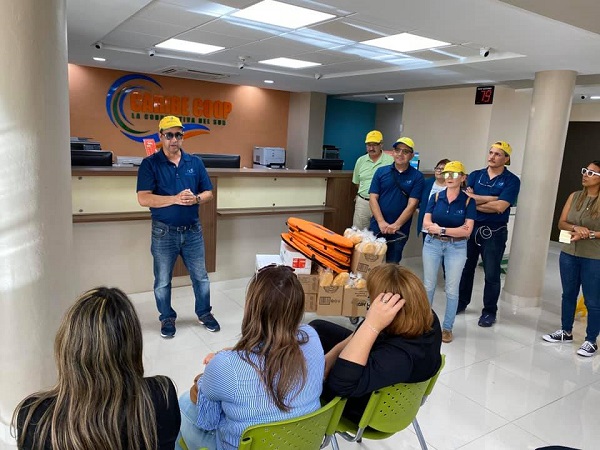
Volunteers from credit unions in northern Puerto Rico meet at Caribe Coop in Guayanilla to deliver support.

Members of the Asociacin de Ejecutivos de Cooperativas de Puerto Rico display a banner in solidarity with credit unions in the south.
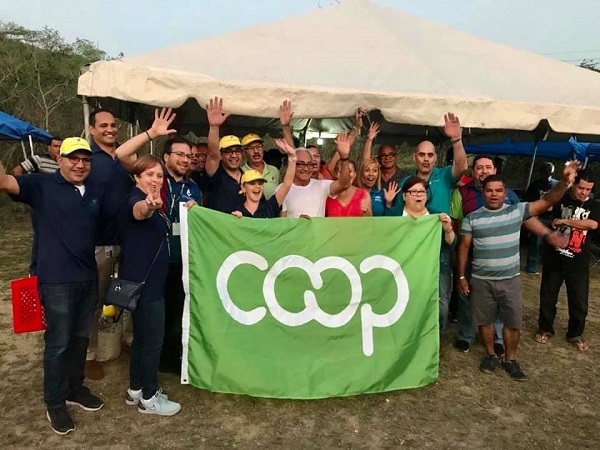
Many buildings, such as this residence in Yauco that is served by the Cooperativa de Ahorro y Credito de Yauco, have suffered severe structural damage.
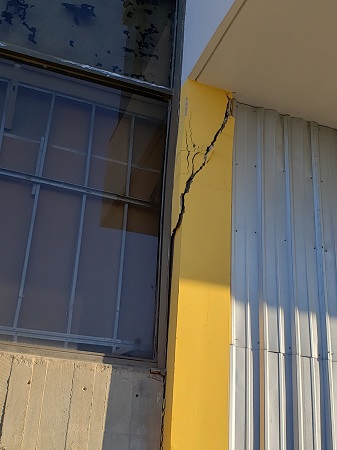
Cracks on an exterior column at Adjuntas Coop in Ponce were among numerous structural issues at the branch
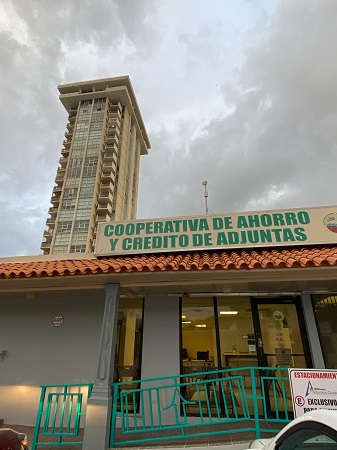
This temporary Ponce branch of Cooperativa De Ahorro Y Credito De Adjuntas opened Jan. 22 15 days after the 6.4 magnitude earthquake struck.
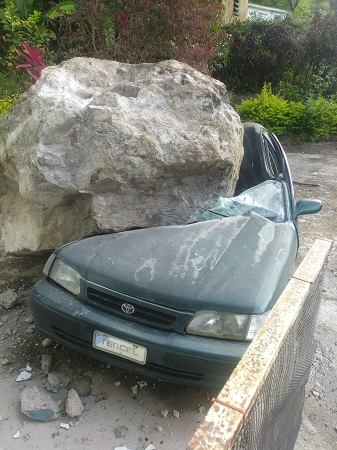
Boulders fell from hillsides during the earthquakes, smashing the vehicle of an employee of Cooperativa ParroCoop in Villalba, Puerto Rico.
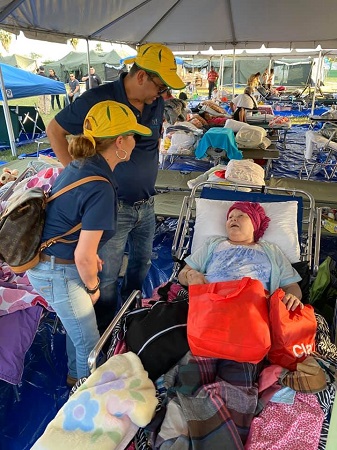
Association volunteers provide relief supplies to earthquake victims living in tents near Yauco, Puerto Rico.
Employees were emotionally affected by the experiences that we are still living today,the CEO says.We are providing measures to channel these emotions.
Rodriguez says Caribe Coop faced similar needs to support employees.
The homes of some of our employees suffered damage and others were emotionally affected,Rodriguez says.We provided emotional help through the resources of psychologists and the cooperative movement that has brought us articles of first need.
According to the CEO, one of the key lessons learned is to include both business and families in the credit unions contingency plan.
Jusino agrees.
We understand how fragile life is and the emotional control needed in the face of adversity,he says.We have to plan for what needs to be done at the family, community, government, and business levels.
Overcoming Political Hurdles
In Puerto Rico, the private sector, the church community, and relief organizations all are playing key roles in the recovery. The government has been widely criticized as slow and ineffective. Perhaps the most telling moment for earthquake victims came on Jan. 18 when residents of Ponce broke into a warehouse and discovered tons of Hurricane Maria relief supplies that had sat dormant for more than 18 months. Puerto Ricos top emergency management director was fired the next day.
The U.S. Office of Management and Budget has placed restrictions on most of the $39 billion in disaster aid earmarked for Puerto Rico after Hurricane Maria, citing potential mismanagement of funds at the state level.
Last week, the U.S. House of Representatives passed a $4.7 billion Puerto Rican disaster relief bill to rebuild roads and bridges and provide community development loans in the wake of the earthquakes; however, that legislation also faces hurdles, as the White House has vowed to oppose the funding. Meanwhile, the NCUAs Office of Credit Union Resources and Expansion has announced the availability of urgent needs grants of up to $7,500 to low-income credit unions that experienced sudden costs to restore operations.
Credit Union Solidarity
In response to community needs, volunteers from more than a dozen credit unions in the north have banded together to help. A busload of volunteers visited the area on Jan. 11 to distribute disaster relief supplies and aid affected credit union employees.
All #CooperativasPR are in solidarity with our cooperative brothers and compatriots of the south, Asociacin de Ejecutivos de Cooperativas de Puerto Rico posted on Facebook.We want you to know that you are not alone and we will continue.
The association has been raising money to help employees and volunteers of the credit unions affected by the earthquakes, including subsidies to cover structural assessments of houses, direct grants to assist with down payments for the purchase of new homes or refinancing for home repairs, financial assistance for small businesses, and mental health services to support impacted communities.
Pushing For Emergency Regulations
Association members met Feb. 4 to develop long-range plans to help hard-hit communities in the south. The group is asking the local chartered credit union regulatory agency, COSSEC, for a new mortgage rule in the disaster zones that would enable impacted families to ask for 100% refinancing of their mortgages, with no down payment, to rebuild their houses.
There is a lot of stress among all the people who live in the south,Ram rez-Ruiz says.Productivity is at the lowest point because a large number of members and their families are moving to the States because of the fear of houses collapsing and businesses closed. Giving deferment on loans is in order. Our only hope is to calm people by giving them confidence, so the economy can be reactivated.
Since Dec. 28, the region has been hit by an estimated 4,000 earthquakes, including a 5.0 magnitude tremor felt throughout the island on Feb. 4. Now, credit unions have shifted their focus from their own recovery to the financial needs of the wider community.
The solidarity of the communities and the private sector as first responders, duly coordinated, is fundamental since there is a lot of bureaucracy and political partisanship at the government level that delays the aid to those affected,Jusino says.In short, you have to prepare for the worst.